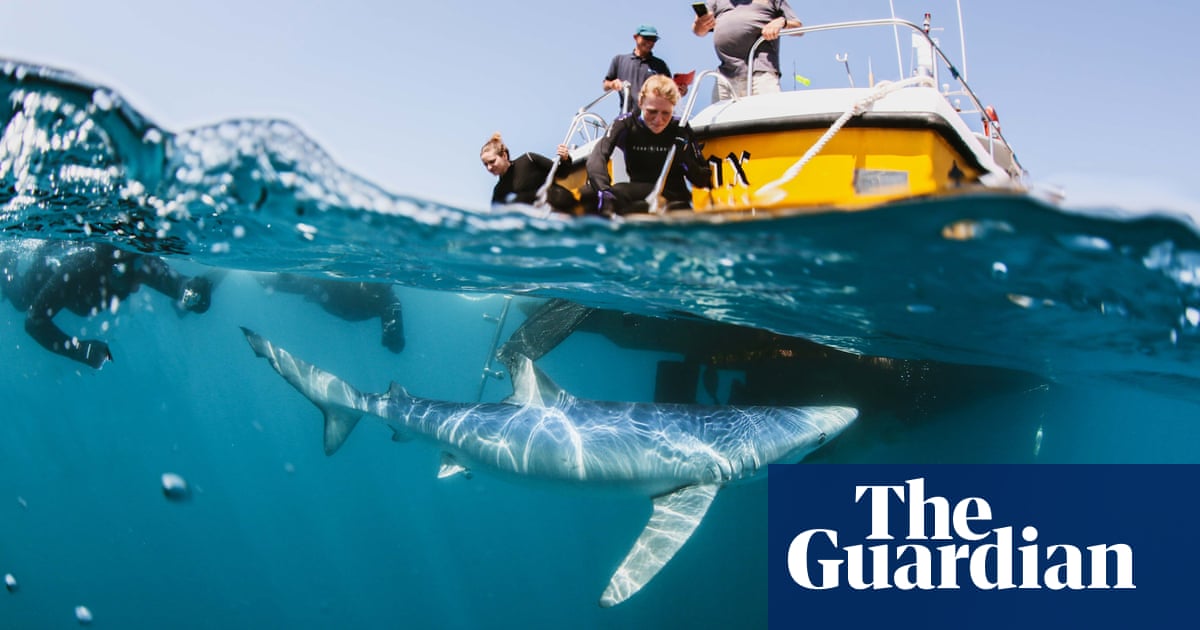We have only been waiting in the grey Atlantic swell a few moments when the first flash of metallic blue appears in the water. A blue shark, a few miles from the coast of Penzance in Cornwall, emerges from the depths. It is time to get in the water â but part of my brain rebels.
âItâs not what you think it will be like ⦠not that ingrained fear that everyone has about sharks. But until you get in the water with them, that fear will remain,â the guide says to the group.
Slipping off the boat, covered head to toe in dark wetsuits, we are instructed not to shout if we see one but to raise a hand, wave and point. We wait, peering through the gloom at the mackerel lure below us. But the shark does not return, and we heave ourselves back on board.
Three hours go by, and finally a flash of silver reappears, sending us scrambling into the sea. I peer into the water and wait. Metres away, others raise their hands, but I see nothing.
Then, a blue shark glides below, black eyes holding ours until it disappears into the gloom. Those lucky enough to catch a glimpse of the predator return to the boat beaming.
The shark-diving industry in Britain is still tiny, with a few providers on the south-west coast in England and Wales, but the idea has attracted increasing interest since the pandemic, spurred by footage of encounters on social media.
âPeople are travelling from all over the country to come and do it. Theyâve got a love of sharks or certainly a curiosity around it,â says Richard Rees, the director of Celtic Deep, which operates off the coast of Pembrokeshire. âWeâre very keen to always say that sharks are not sort of like harmless puppy dogs. They should be respected for what they are: apex predators in the ocean,â he says.
Blue sharks, which can grow nearly 4 metres long, are at risk of extinction, according to the IUCN red list. They are threatened by finning and harmful fishing practices that claim the lives of about 20 million a year. They feed on squid and small fish, and are not a danger to humans, with only a handful of recorded bites since 1580 â 10 according to International Shark Attack File.
It is a sign of how rare shark attacks are in the UK that some statistics include a bite that took place in a pub in the West Midlands, more than 50 miles from the sea. The chef was reportedly attacked by a black-tipped reef shark in a restaurant aquarium while feeding the animals prawns in 2000.
But the growing UK sector was rattled in 2022, shortly after my own dive, when a woman on a blue shark tour was bitten on the leg, in an incredibly rare example of an âunprovokedâ attack in British waters.
The bitten woman, who walked off the boat, issued a statement through the company saying she was scared but fine: âDespite how the trip ended, it was amazing to see such majestic creatures in the wild and I donât for a second want this freak event to tarnish the reputation of an already persecuted species.â
The bite was a blow to the tour operators. Two years on, however, the sector has not seen a drop-off in bookings for experiences with blue sharks.
âThe incident in Penzance in 2022 was an unfortunate occasion. Blue sharks feed on fish and squid mostly, so going after something big like a human is super rare â in fact, this was the first incident with a blue shark in-water ever reported,â says Gonzalo Araujo, the director of Marine Research and Conservation Foundation, who works with tour operators to study blue sharks in the UK. âIt is unlikely to happen again.â
As the number of UK shark swimming operations grows, many are teaming up to develop a common set of standards to keep people and sharks safe. Alongside wearing dark wetsuits and not displaying jewellery, thereâs a ban on handfeeding the inquisitive fish.
Operators say they have been busy with bookings for the summer ahead. From June to October, the creature is one of more than 30 shark species thought to be in British waters. The animals visit the UKâs south-west coast in the summer, travelling thousands of miles from the Azores to the Caribbean and back to Britain and Ireland in their north Atlantic territory.
Some tours are working with university researchers to aid the survival of the species, testing magnets to repel the sharks in the hope that they can one day be used on long-line trawlers to stop them being caught as bycatch. But for many operators, it is about showing people a different side of the UK.
âWhen we can get people in the water out in the Celtic deep, where the water is clear, warm, really blue and they can have these encounters with amazing animals â not just the sharks, but other animals, too â it might just paint a different picture of the marine wildlife here,â Rees says.



